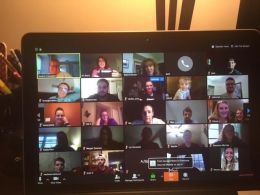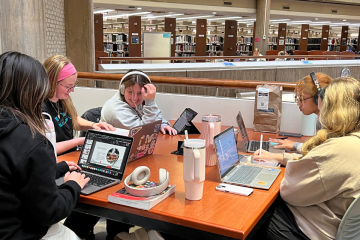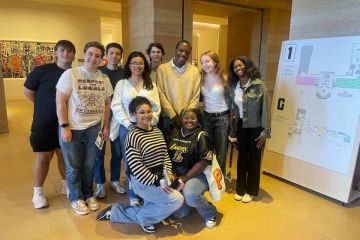Hands-On Learning Delivered Virtually

Hands-on learning is a cornerstone of the Widener student experience. The move to an online learning environment in light of the Coronavirus pandemic presented a wave of challenges to delivering meaningful, hands-on learning, particularly for programs that include in-person clinical components.
Despite these challenges, Widener faculty and staff are harnessing the power of technology to meet the teaching requirements and simulate hands-on learning experience from a safe distance.
In the graduate physical therapy program, faculty are finding creative solutions to supplement clinical reasoning that would usually occur in the classroom. Utilizing virtual conference rooms, professors moved from the front of the classroom to the front of the camera to demonstrate patient-client interactions guided by the graduate physical therapy students on the other end of the virtual platform.
“They give us a patient case and we talk them through anything that we would do,” said Megan Racioppi, a second-year graduate physical therapy student.
Racioppi says that remote learning, while initially challenging, has given her and her classmates the opportunity to build upon their clinical foundations “so now we’re sharpening up on our clinical decision-making skills.”
According to Racioppi, the new digital learning format doesn’t deter from the coursework, and is even helpful for students who learn best from visual demonstrations.
“As visual learners it was beneficial to watch the lab as other people were doing it, so I think we still were able to get really good learning experiences,” Racioppi said.
While virtual learning can’t fully replace onsite hands-on experiences, programs, like the School of Nursing, are taking advantage of high-quality programs and tools available online to give students simulated patient experiences.
“With the given circumstances I’m still learning almost as much as I would be with the hands-on experience at the clinical site itself,” said nursing student Gabrielle Smyser.
Smyser, a junior, is finishing her semester at home practicing clinical skills online through virtual patient simulation programming.
The same motions we would be doing in the real setting are what we’re doing online, but now it’s just a push of a button to make a command happen with a mouse pad rather than physically doing it ourselves —Gabrielle Smyser '21
She compares the virtual simulations to the videogame The Sims, only instead of building a community, the students are tasked with assessing patient needs and delivering the appropriate care plan from a distance.
“You get assigned a patient, and you get assigned their case, and you can even figure out a way to work interprofessionally with other care teams,” said Smyser.
For graduate students in the clinical psychology program who are continuing clinical internships and practicums remotely, the opportunity to learn online remotely serves as an introduction to the growing world of telehealth.
“Our students are now getting a mentored experience of learning how to be telehealth providers in this really unprecedented time,” said Mary Rourke, associate professor and director of the Institute for Graduate Clinical Psychology.
Rourke added that the almost immediate transition to online underscores the support among students, faculty, as well as alumni, many of whom are clinical coordinators for current students.
One of the things that I’m really delighted by is that our community…has really pulled together in this fabulous way and done a really seamless transition of, wherever possible, they have switched over to telehealth —Mary Rourke, associate professor and director of the Institute for Graduate Clinical Psychology
The impact of continuing to live and learn through this unprecedented time is not lost on students as they prepare to enter their respective health care fields. For Smyser, watching this pandemic unfold underscores her passion to become a nurse.
“When I signed up for nursing school, I knew that at one point in my career I would be dealing with something like this.”
Recognizing the horrible circumstances across the country right now, Smyser can’t help but feel motivated by the role models appearing across the global health care system.
“If I could be thankful for one thing at the moment, it’s seeing how nurses in the health care system are working to help those in need in this situation.”




